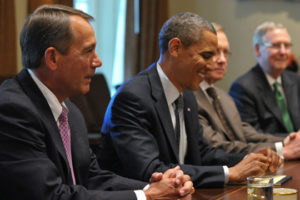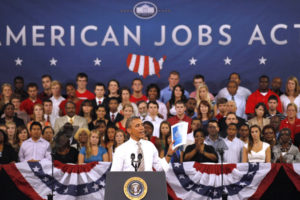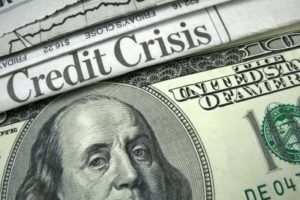The freefall in the U.S. economy that begin in August 2007 is now stabilizing. The disruption in the housing market that ignited a wildfire in the credit markets is no longer a crisis situation as home sales, housing starts, and permit activity increases from improved affordability. Equity markets are rebounding, credit is loosening, banks are raising capital to pay back taxpayers, and economists are expecting the recession to be over in the fall. In fact, recent reports are showing that weekly jobless claims are now rising at a slower pace than most economists estimated. Consumers are cautiously returning to retail outlets to take advantage of once in a lifetime deals. The media and most pundits are obsessed with the discussion of “green shoots” that are now appearing from a scorched Wall Street. Some will argue that President Obama’s ambitious domestic agenda of reinvesting in the country through government spending along with a multitude of reforms are having a positive influence on the economy.
Will government spending lead to a recovery?
Unquestionably, stimulus spending will create short-term benefits, but Obama’s war on American capitalism will not lead to a full economic recovery. The rise in job losses is not over and the unemployment rate could reach 10% by the end of the year. The slack in the jobs market will cause wage growth to remain stagnate. Rising unemployment, slow to no wage growth, and consumers willingness to save over spend will combine to keep consumption down and the economy in the doldrums. Undoubtedly, fiscal and monetary stimulus is creating a recovery, but not one that is sustainable.
Americans blame George Bush for creating the current recession, but it is now coming to an end. The new recession will be triggered by massive deficits and rising inflation from new government spending. The cost to taxpayers for the $700 billion TARP has now risen from $186 billion to $368 billion, compound that spending with an aggressive stimulus bill that will cost taxpayers an additional $300 billion, and U.S. borrowing will reach $3 trillion to $4 trillion over the next two years, which outpaces the $1 trillion a year average of the last three years. On the campaign trail, Obama rightfully criticized the $2.3 trillion added to the national debt under Bush as “deficits as far as the eye can see”, but Obama’s budget of $3.6 trillion will add $9.3 trillion in debt over the next 10 years. Obama will be forced to print more money – triggering higher inflation, let interest rates soar, or raise taxes, all of which will kill the recovery.
Full economic recovery is contingent upon healthy companies that are willing to invest in our country to expand their businesses along with a stable and confident workforce. Consumers are becoming wise to what is occurring in the U.S. under the Obama Administration and they are deleveraging. In other words, consumers are no longer consuming, but they are paying down debt and increasing household savings. Eventually, that could lead to a sustainable recovery, but hyper inflation caused by too much fiscal and monetary stimulus will challenge consumers and derail any improvements in the economy.
Change is coming…
Candidate Obama promised sweeping reforms if elected and President Obama is delivering on that promise. His ambitious agenda include reforms to the federal budget, tax code, healthcare, and the environment. However, when examining Obama’s legislative proposals, there are many inconsistencies.
For example, Candidate Obama promised to “take a scalpel to the federal budget”, but President Obama outlined 121 cuts worth only $17 billion or less than 1% of his bloated budget request. Mr. Obama needs to sharpen his scalpel. Recently, Obama proposed that Congress reinstitute “Pay Go” provisions, which requires Congress to cut certain areas of the budget to offset new spending. However, he wants Congress to implement the rules after passage of his budget that is full of goodies.
Candidate Obama assured no new taxes for the middle class; however, he signed legislation that raised the cigarette tax to pay for SCHIP or also known as the state children’s health insurance plan. In addition, he proposed new taxes on unhealthy foods, sodas, and beer, not to mention, Obama’s plan to reduce greenhouse gas emissions through a cap and trade system that will drive up the cost for anyone that drives a car, has a job, or turns on a light. I suppose the middle class do not eat, drink, smoke, or use electricity!
Candidate Obama criticized “government-run health care” in 2008, but President Obama routinely calls for Congress to create a universal health care system by the end of 2009 with little to no details on how the U.S. will cover the $650 billion price tag over the next 10 years. Currently, the federal and state government controls about 60% of the health care economy. Surely, if the government were experts at administering a health care system, then Medicare, Medicaid, and other federal health programs would be far more effective.
Bush increased the proportion of American families that pay no federal income tax from 33% to 38%; Obama will raise it to 44% while proposing that the richest 2% will pay for his bucket of reforms. Most wealthy Americans have lost 40% of their net worth as the recession has now slowed the growing inequality that was fuelled by capital gains, bonuses, and Wall Street profits.
The wealthy will not be able to shoulder the bills of Uncle Sam, which will leave this country farther in debt and with higher taxes on the middle class. Obama should explain to Americans that his ambitious social agenda will cost real money and they should be prepared to pay for it.
Has Obama failed?
Not by his own perception because he never wanted to stimulate the economy, but instead his goal was to expand the spending and size of government. Before Obama, government spending accounted for 35% of GDP, but after stimulus spending and universal health care, the government’s proportion will be around 45% of GDP. Income generated from public sector employment is up from $1.16 trillion in January when Obama took office and government social spending and public sector jobs now account for 26% of U.S. personal income.
“Obamanomics” or better known as “socialism” will not create a sustainable recovery. Remember the words of President Reagan – “The nine most terrifying words in the English language are: I’m from the government and I’m here to help.” Obama should do what he will not do – cut government spending by cancelling the rest of the stimulus outlays, abandon the idea of universal health care, and reform the overly burdensome tax code to stimulate business investment and wage growth.




